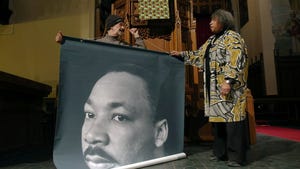Rosa Parks papers give insight into the civil rights icon
WASHINGTON – The mother of the modern civil rights movement received a Congressional Gold Medal and the Presidential Medal of Freedom, and was sought out by world leaders, popes and politicians as a symbol of quiet resistance and strength. A statue of her stands in the U.S. Capitol.
But Rosa Parks also had a recipe for featherlight pancakes. She liked to jot prayers that would come to her on slips of paper, or on the back of church bulletins.
For most of her life, she kept a handful of letters from a classmate who moved away when they were girls — the two gossiping in them about boys and their studies.
But there also are notes of her arrest and the important work and shared struggles between fellow icons of the civil rights movement, like Dr. Martin Luther King Jr. And we also learn how much she missed her husband while fighting the good fight.
On Wednesday, the 102nd anniversary of Parks' birth, the Library of Congress will open to researchers a trove of 7,500 manuscripts and 2,500 photos from her personal collection; an archive of handwritten notes, mementos, honors and correspondence that had languished in warehouses in New York and Michigan for nearly a decade since her death in her adopted home of Detroit in 2005.
In them, she talks about the Jim Crow laws in the South she grew up under, and sketches notes about the seminal 1955 bus boycott in Montgomery, Ala., she sparked when she was arrested for refusing a bus driver's order to give up her seat to a white passenger.
There are photos of her with Stokely Carmichael and Shirley Chisholm. There is a postcard from Rome from Dr. Martin Luther King Jr.
"We are really in the thick of it now. Rev. King's home was bombed last night while we were at the First Baptist Church mass meeting. His wife and baby were in the house but not hurt," she writes her mother in a letter drafted after the Jan. 30, 1956, attack in Montgomery.
Pope and poll tax
But amid all the witness-to-history artifacts — a note after she's had dinner with future Supreme Court Justice Thurgood Marshall, for instance, or her ID card for the Southern Christian Leadership Conference's 1968 Poor People's Campaign, or a copy of a 1999 letter she sent to Pope John Paul II after meeting him — is the ordinary, the everyday, the mundane.
It is made all the more remarkable for it being hers.
A copy of a 1957 poll tax receipt for $1.50, a remnant of a now-forbidden Jim Crow practice forcing blacks and others to pay their way into the voting booth. A pocket-sized Gideon Bible she carried in her purse. A dues book for her membership in the Order of the Eastern Star, State of Alabama, 1940.
Snapshots of her husband, Raymond Parks, and her childhood home. A long-ago letter from a young niece. Her husband's barber certificate.
"I hope you are all right and that mother is well and you do not miss me too much. I am fine," she wrote to "Parks, my dear husband" in Detroit in October 1957 from Hampton, Va., where she — unable to find work elsewhere — had taken a job as a hostess at an inn for a salary of $308.33 a month.
She was looking for work for him there as a barber so he could join her, she wrote, even enlisting the help of someone who ran an all-white barbershop to let her know if he heard of any positions open.
"I miss you so very much and wish you were here," she continued. "The weather is not cold now but you should be here to warm my feet by the time winter comes."
Life in Detroit
The Parkses moved to Detroit in 1957, unable to work in Alabama, and much of the collection stands as a growing testament not only to their time in Michigan — a program from St. Matthew AME Church on Glendale, a program for a local African History Club and its annual tribute to Paul Robeson in a school auditorium — but to their troubles.
They were so financially strapped, they relied for a time on donations to help pay medical bills.
"I was so glad to get your letter and hope some money has come in, other than the $100. … Ralph Abernathy said the hospital bill was over $500 so I know you are in a bad fix," white civil rights activist Virginia Durr, a friend of Parks in Montgomery, wrote her in 1960, after she had returned from Virginia and was hospitalized with an ulcer.
Her financial troubles would continue until she helped elect John Conyers to Congress in 1964 — asking King for his help in doing so — and Conyers hired her. She worked in his office until 1988.
Loan to library
"I would say personal is the perfect way to describe it," said Margaret McAleer, senior archives specialist for the library. "These are the things she carried with her from home to home to home. And it's amazing it survived."
The collection came to the library late last year on a decade-long loan from the Howard G. Buffett Foundation, which purchased them from the estate for $4.5 million.
A sampling of items from the collection will be on display in glass cases in the library's historic Jefferson Building in Washington from March 2-30. And several items will be included in the library's exhibit on the Civil Rights Act of 1964, which begins March 7 and runs through Sept. 12.
Researchers, meanwhile, will have access to all of the materials, which, taken together, will help inform historians about the civil rights struggle. They also paint a picture of an uncomplaining woman strong enough to weather personal troubles and who had a clear understanding of the oppressive culture she was born into.
She drafted letters and notes describing the times, talking about how blacks could work behind the luncheonette counters but not be served at them, and how white newspaper readers objected to referring to black women as "Miss" or "Mrs."
She spoke of the "lynch-murder of Young Emmett Till of Chicago," saying, "This case could be multiplied many times in the South. ... It is the custom to keep such things covered up."
She describes her feelings leading up to her quiet act of resistance: "I had been pushed around all my life and felt at this moment that I couldn't take it anymore. ...We soothe ourselves with the salve of attempted indifference, accepting the false pattern set up by the horrible restrictions of Jim Crow. ... Let us look at Jim Crow for the criminal he is."
"There is just so much hurt, disappointment and oppression one can take. … the line between reason and madness grows thinner."
Considering her iconic status in the history of civil rights, it is easy to look at such writings and forget she was a woman, too. It is a myth much of the rest of the collection readily dispels.
Her pancake recipe calls for peanut butter. Her childhood friend, named Galatas, wrote saying she was sorry Rosa's new boyfriend — her husband-to-be — wouldn't cut her long hair because he loved it so.
Under the word, "Closing," Rosa Parks wrote on a loose slip of paper: "Oh, man, what doth the Lord request of thee: to do justly — to love mercy and walk humbly with thy God."
Contact Todd Spangler: 703-854-8947 or tspangler@freepress.com. Follow him on Twitter @tsspangler.
ABOUT THE ROSA PARKS COLLECTION
Purchased by the Howard G. Buffett Foundation last summer, the Rosa Parks Collection includes about 7,500 manuscripts and 2,500 photographs kept by the civil rights icon who died in her adopted home of Detroit in 2005. The Library of Congress in Washington, D.C., which will house them on a 10-year-loan, will make them available to researchers for the first time beginning Wednesday, the 102nd anniversary of Parks' birth in Tuskegee, Ala.
A sampling of the items will be on display in glass cases at the library's Jefferson Building from March 2-30. Several items will be included in the library's exhibit, "The Civil Rights Act of 1964: A Long Struggle for Freedom," March 7 to Sept. 12.
Voting is beautiful, be beautiful ~ vote.©




No comments:
Post a Comment